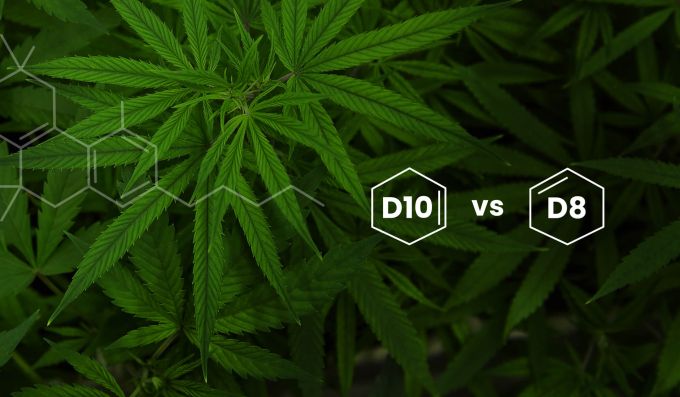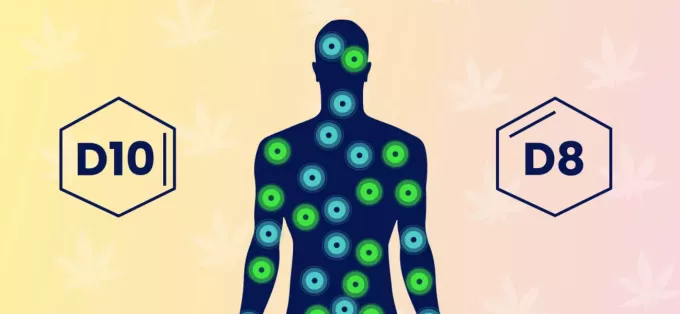Delta 10 and Delta 8 are treatments for insomnia, anxiety, nausea, and depression. But before choosing any of these options as treatment, you need answers. Starting from what is Delta 10 we’re going to ask if Delta 10 is different from Delta 8? — In other words, let’s compare Delta 10 vs Delta 8.
The answers to those questions will lead to you understanding the exact delta right for you. And why is it preferable to the other, even though they are both tetrahydrocannabinol (THC) compounds from the hemp plant?
Tetrahydrocannabinol (THC) is the principal psychotropic compound found in the cannabis plant. It is the chemical formula for Delta 9 isomers. Delta 9 is the main compound present in the cannabis plant, responsible for the “highness” effect.
What Is Delta 10?
Delta 10 is a cannabinoid present in minor amounts in the hemp plant. But they extract a more significant quantity from the cannabis in the lab. They process it from hemp-derived CBD, legalized for use in the 50 states.
Delta 10 has a chemical structure like Delta 9 THC. However, the location of the double carbon bonds in their carbon chain is different. The position of the double bond determines their names. Delta 10 has its double carbon bond on the tenth carbon and Delta 9 on the ninth.
Does the location of the double carbon matter? Yes, it does. It provides the answer to the question above — what is Delta 10? The location of the double carbon affects how the THCs (D8, D9, D10) interact with the drug receptors in the body. It also affects how much "highness" the user experiences.
Another difference between the famous Delta 9 THC and the newly introduced Delta 10 THC IS their psychoactive effects. The potency of Delta 10 is not as high as that of Delta 9. And people take it as gummies, oil, tropicals, edibles, vape carts, etc.

Delta 10 vs Delta 8 - Discover the Difference
Delta 8 is another psychoactive cannabinoid on the rise. It shares the same chemical structure as Delta 10. The double bond has a different position on the carbon — the eighth carbon. Just as we have Delta 10 in trace amounts in the cannabis plant, the same goes for Delta 8. And they create a more significant proportion in the lab. These two similarities might be all Delta 10 and Delta 8 share, and it is crucial to understand what is Delta 10.
Although there is more quantity of Delta 8, its "highness" is more substantial and more lasting when comparing Delta 10 vs Delta 8. However, both are weaker than Delta 9. Delta 8 is mildly psychoactive because of its calming effect compared to Delta 10 energizing properties.
Delta 8 is a more suitable alternative to Delta 9 than Delta 10. Their uses and benefits are different, and we’ll thoroughly discuss them.
Have a look at Delta 10 vs Delta 8; side-by-side:
|
Delta 10 |
Delta 8 |
|---|---|
|
The psychoactive effect of Delta 10 doesn't last long. |
On the other hand, Delta 8 "highness" is more substantial and more lasting when comparing Delta 10 vs. Delta 8. |
|
Delta 10 has energizing properties. |
They refer to Delta 8 as mild psychoactive because of its calming effect. |
|
Delta 10 is found in less quantity. |
It is found in more quantity than Delta 10 but not than Delta 9. |
|
The position of the double bond on the carbon chain for Delta 10 is on its 10th carbon |
The position of the double bond on the carbon chain for Delta 8 is on its 8th carbon |
|
Delta 10 is not a suitable alternative to Delta 9 |
Delta 8 is a suitable alternative to Delta 9. |
What You Need To Know About Delta 10 and Delta 8
You need due diligence when dealing with cannabinoids, especially with the new introductions. Delta 10 is still unique in the market. Medical research on what is delta 10 is still ongoing. Its usage has been helpful as the research has been progressive.
Cannabinoids are a 21-carbon group containing terpene phenolic compounds. These compounds are found only in Cannabis species. They are called Phytocannabinoids. Examples include Delta 9 (the most potent and famous), Delta 8, and Delta 10.
The lack of medical research on what is Delta 10 causes the availability of little information on its side effects. Delta 8 has been on the market for a while now. And they have conducted more research on it and its side effects. Findings include drowsiness, diarrhea, fatigue, anxiety, and dryness of the mouth and eyes.
These side effects occur in cases of an overdose. You must follow the doctor prescribed dosage, even when dealing with Delta 10.
The Legality of Delta 10 vs Delta 8
You can consider Delta 10 legal because hemp is federally legal. And we know Delta 10 is a derivative of hemp, so are Delta 8 and 9. Based on the 2018 US Farm Bill, hemp and its derivatives are legal for use. However, with the condition that they must carry less than 0.3% THC on a dry weight basis.
Although legalized in 50 states in the United States, some states will not engage in sales and shipping if the law remains unclear. Some states have banned the sale and importation of Delta 8 and 10. It is advisable to check and get updates on your vicinity's local and state laws before considering Delta 10 or Delta 8.
It has been found that Delta 8 is good as a medication to treat nausea and other illnesses. In a published study back in 1995 Delta 8 prevented a range of after-effects caused by chemotherapy. Yet they haven’t given it full approval. While Delta 10 has little or no evidence to back its medicinal effects.
Let’s look at Delta 10 vs Delta 8 legality, side-by-side:
|
Delta 10 |
Delta 8 |
|---|---|
|
You can ship Delta 10 to 50 states. |
There is a prohibition of Delta 8 in more locations than Delta 10. You cannot send it to Arkansas, Colorado, Alaska, Kentucky, Idaho, Montana, New York, Delaware, Iowa, Mississippi, Rhode Island, Utah, Vermont, and Arizona. |
|
Delta 10 is widely available in the market. |
Availability of Delta 8 is less when comparing Delta 10 vs. Delta. |
|
There is a high acceptance of Delta 10. |
We have a low acceptance of Delta 8 in the market because of its higher restrictions. |
|
No medical evidence is available on Delta 10. |
Delta 8 has more tested medical experiments. |
The Benefits of Delta 10
Currently, more anecdotal evidence supports what is Delta 10 and its positive uses than scientific research. This anecdotal evidence has proven two beneficial uses of Delta 10. They include use as a stress reliever and as a treatment of anxiety. It is also used to improve productivity, alertness, and focus.
Treatment for Anxiety
The relaxation properties produced by Delta 10 are devoid of the paranoia and anxiety effects that might occur after consuming D8 or D9. This makes it the best option for treating anxiety without sedation.
As a Stress Reliever
Delta 10 doesn’t produce euphoric effects like Delta 8. Instead, a relaxing and calming effect follows its use. And it aids in lifting depressing moods and increasing energy.
More Benefits of Delta 10:
-
It helps improve productivity
-
Helps to improve alertness
-
It helps to improve focus
Delta 10 Effects: Does Delta 10 Get You High? – Yes, It’s Psychoactive!
Delta 10 can get you “high'' as it produces a relaxing and uplifting effect when consumed. Taking it does not cause anxiety or paranoia. Instead, its mild effect relieves stress and helps with relaxation. Delta 8 will probably help with sleep, while Delta 10 will increase your creativity level.
It is less potent than the very effective Delta 9. It also provides energizing effects compared to Delta 8 sedating properties. Although these effects are based on research rather than scientific study on what is delta 10. They are accurate, but people might react differently.

Is Delta 10 Safe? How Does It Compare vs. Delta 8?
Delta 10 reduces stress and is most suitable for relaxation. While Delta 8 is a better choice for treating inflammation and as a pain reliever.
They are both safe for usage. Still, their uses are not the same. This is because their potency levels and chemical structure differ. Their chemical structure affects their impact on the CB1 and CB2 receptors. Delta 10 produces a relaxing experience to ease off stress when taken. Therefore, it is preferable when trying to unwind after a long day. It is also suitable for overcoming pressure while at a gathering.
Delta 8 is ideal for combating pain and inflammation. Doctors prescribe it as a pain reliever. Its effect on the CB1 and CB2 receptors in the brain helps prevent inflammation.
Delta 10 reduces stress and is helpful when struggling with anxiety or depression. We consider it safer than Delta 8 because it affects the brain's CB1 and CB2 receptors.
Since your safety is the topic, you might avoid Delta 8, especially with marijuana and cannabis oil. As it will affect coordination, increasing the risks of getting into accidents.
Delta 8’s higher potency level could cause paranoia and worsen anxiety instead of reducing it. Delta 10 doesn’t produce these side effects.
Another reason Delta 10 is safer to use than Delta 8 is that it affects the CB1 and CB2 receptors of the brain. While the more potent Delta 8 affects judgment and coordination.
A doctor or a certified medical professional visit will save you worry, uncertainty, and life. They can help you decide which THC to go for and prescribe the recommended amount.
Can You Combine Both Cannabinoids?
What happens when you combine Delta 8 (a pain reliever) and Delta 10 (gives a calming effect)? And is it even possible to do that? Mixing cannabinoids is widespread in the marijuana community, and people react differently.
Sometimes users combine both cannabinoids to get the best out of each, simultaneously balancing the side effects of the cannabinoids.
Before combining Delta 8 and 10, ensure you have permission to do so by a certified medical professional or a physician. It would be best to consume only the prescribed dosage. Combining cannabinoids and messing up the dosage could lead to more harm than good.
In the past, they have practiced the combination of CBD and Delta 9 for years. So, combining Delta 8 and Delta 10 is not the wildest idea as their combination could meet up to your health needs. Still, it is safer to get permission from your physician to try it.
Usually, the physician will advise you to start with small quantities of each cannabinoid and monitor how you react to it. If there’s a positive reaction, the dosage increases and the practice should stop if negative.
Your body might handle it once you understand that the response you get from taking cannabinoids without combining is not the same as when you combine them.
Some vendors have the Delta-8-9-10 mix. Getting this could be more dangerous than helpful. Because a combination of 3 cannabinoids could be too much or not enough. The former could lead to harmful side effects and the latter to a cannabinoid addiction.
The best way to enjoy combining cannabinoids is by getting quality, safe, and well-tested cannabinoids from an accredited lab. Then seek advice and permission from your doctor before combining the cannabinoids.

How Do Delta 10 and Delta 8 Affect the Endocannabinoid System?
Like the digestive system, excretory system, respiratory system, etc., we also have the endocannabinoid system (ECS). It is part of the intricate human body networks that balance and maintain health. To understand what is Delta 10, you have to know how the ECS works.
The ECS is the system of a network of cell receptors that produces an effect when affected by cannabinoids. The body produces its cannabinoids, and they are called endocannabinoids.
The ECS handles many physiological functions in the body. Such as how the immune system and pain receptors function. And it is a part of the center of control for sleep and mood changes.
When consumed by Delta 8 and 10, the ECS determines the user's reactions. They activate the psychoactive effects of the CB1 and CB2 receptors.
Euphoria, relaxation, highness, and feeling focused and uplifted are potential effects taking cannabinoids can have on the ECS. It also relieves pain, reduces tumor sizes, stimulates appetite, and decreases vomiting and nausea.
The higher intensity and potency of Delta 8 also influence these receptors. And it produces a more psychoactive effect on the receptors than Delta 10.
Combining cannabinoids; adding marijuana, CBD, and cannabis oil is not a bad practice. However, a correct ratio is necessary to produce a more potent product that will intensify the reaction to the brain’s receptors.
Verdict: So, Which Is Better?
The answer to the above questions depends on the following questions:
-
Are you comfortable using cannabinoids?
-
What is Delta 10? What is Delta 8? And why do I want to use them (as a pain reliever or to ease stress)?
-
Is this safe to take when combating addiction problems?
-
Should I consider other options first?
The answers will guide you in making the best decision as you communicate with your doctor. But if you went through stress and need to relax, Delta 10 is the preferable option and the best choice. And for stimulating appetites and a good night's sleep, Delta 8 is the better option.














